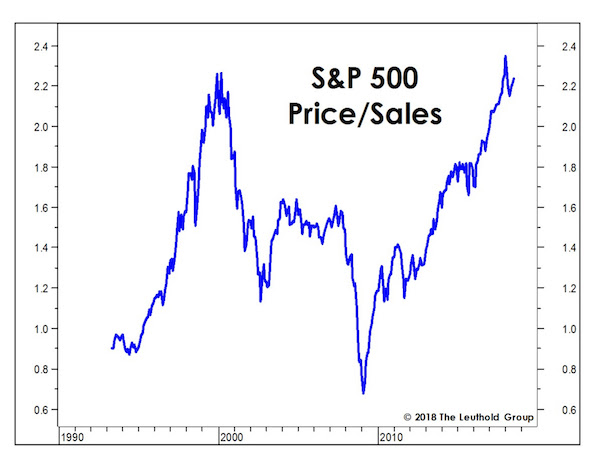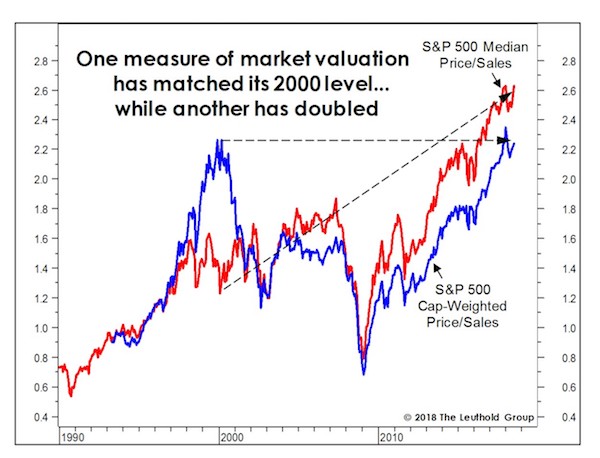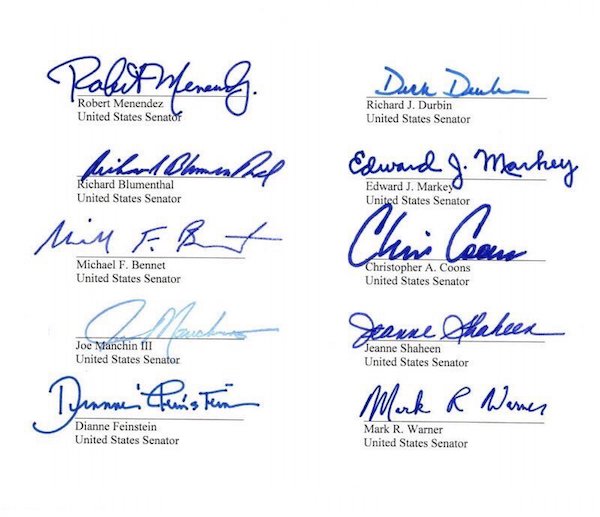
Eugène-Louis Boudin Laundresses on the Beach at Étretat 1892

Cycles, but distorted.
• Behold The ‘Scariest Chart’ For The Stock Market (MW)
A lot has changed since the stock market crash of 2000. Apple Inc. has gone from being just another computer brand to becoming the most valuable company in the world, Amazon.com Inc. went from being an e-book retailer to a byword for online shopping and Tesla’s Elon Musk has risen from obscurity to Twitter stardom. Yet some things never change and Doug Ramsey, chief investment officer at Leuthold Group, has been on a mini-campaign highlighting the parallels between 2000 and 2018. Among the numerous similarities is the elevated valuation of the S&P 500 then and now, which Ramsey illustrates in a chart that he has dubbed as the “scariest chart in our database.”

“Recall that the initial visit to present levels was followed by the S&P 500’s first-ever negative total return decade,” he said in a recent blog post. Price-to-sales ratio is one measure of a stocks value. It isn’t as popular as the price-to-earnings ratio, or P/E, but is viewed as less susceptible to manipulation since it is based on revenue. He also shared a chart which he claims is “unfit for a family-friendly publication” that shows how in terms of median price to sales ratio, the S&P 500 is twice as expensive as it was in 2000.


Senator Mark Warner (D-VA) pops up all over the place. Involved in killing off talks with Assange in spring 2017, a year later calls for Assange’s asylum to be revoked, then weeks later wants him to testify.
• US Senate Calls On Julian Assange To Testify (ZH)
Julian Assange has been asked to testify before the US Senate Intelligence Committee as part of their Russia investigation, according to a letter signed by Senators Richard Burr (R-NC) and Mark Warner (D-VA) posted by the official WikiLeaks Twitter account. The letter, delivered to Assange at the Ecuadorian embassy in London, reads in part “As part of the inquiry, the Committee requests that you make yourself available for a closed interview with bipartisan Committee staff at a mutually agreeable time and location.” Wikileaks’ says their legal team is “considering the offer but testimony must conform to a high ethical standard,” after which the whistleblower organization added a tweet linking to a list of 10 Democratic Senators who demanded in late June that Assange’s asylum be revoked in violation of international law:

[..] Last August, Congressman Dana Rohrabacher travelled to London with journalist Charles Johnson for a meeting with Assange, after which Rohrabacher said the WikiLeaks founder offered “firsthand” information proving that the Trump campaign did not collude with Russia, and which would refute the Russian hacking theory. After Trump denied knowledge of the potential deal, Rohrabacher raged at Trump’s Chief of Staff, John Kelly, for constructing a “wall” around President Trump by “people who do not want to expose this fraud.” And in January of 2017, Julian Assange’s legal team approached Clinton-linked D.C. lobbyist Adam Waldman to reach out and see if anyone in the Trump administration would negotiate with the WikiLeaks founder – only to have James Comey kill the deal.

More from Sen. Mark Warner. h/t Tyler
• Senate Democrats Circulate Plans for Government Takeover of Internet (Reason)
A leaked memo circulating among Senate Democrats contains a host of bonkers authoritarian proposals for regulating digital platforms, purportedly as a way to get tough on Russian bots and fake news. To save American trust in “our institutions, democracy, free press, and markets,” it suggests, we need unprecedented and undemocratic government intervention into online press and markets, including “comprehensive (GDPR-like) data protection legislation” of the sort enacted in the E.U.
Titled “Potential Policy Proposals for Regulation of Social Media and Technology Firms,” the draft policy paper—penned by Sen. Mark Warner and leaked by an unknown source to Axios—the paper starts out by noting that Russians have long spread disinformation, including when “the Soviets tried to spread ‘fake news’ denigrating Martin Luther King” (here he fails to mention that the Americans in charge at the time did the same). But NOW IT’S DIFFERENT, because technology. “Today’s tools seem almost built for Russian disinformation techniques,” Warner opines. And the ones to come, he assures us, will be even worse.

Evidence is so last century.
• US To Impose Fresh Sanctions On Russia Over Salisbury Attack (Ind.)
The US government has said it will impose fresh sanctions on Russia after determining it used a nerve agent in the attack against a former Russian spy in Salisbury. The State Department said the sanctions will be imposed on Moscow because it used a chemical weapon in violation of international law in the attack on former Russian spy, Sergei Skripal, 67, and his daughter Yulia, 33. The pair were poisoned by a military-grade nerve agent called novichok in Salisbury, UK, in March. Following a 15-day Congressional notification period, the new US sanctions will take effect on or around 22 August, according to a statement.
[..] State Department spokesperson Heather Nauert said it had been determined Russia had “used chemical or biological weapons in violation of international law, or has used lethal chemical or biological weapons against its own nationals.” “Following the use of a Novichok nerve agent in an attempt to assassinate UK citizen Sergei Skripal and his daughter Yulia Skripal, the United States, on 6 August, 2018, determined under the Chemical and Biological Weapons Control and Warfare Elimination Act of 1991 (CBW Act) that the government of the Russian Federation has used chemical or biological weapons in violation of international law or has used lethal chemical or biological weapons against its own nationals,” a statement said.
The sanctions will cover sensitive national security goods, a senior State Department official said. There would, however, be exemptions for space flight activities and areas covering commercial passenger aviation safety, which would be allowed on a case by case basis, the official added. A second batch of “more draconian” sanctions would be imposed after 90 days unless Russia gives “reliable assurances” that it will no longer use chemical weapons and allow on-site inspections by the United Nations.

Russia should stop trying to deny anything, it makes no difference anyway.
• Russia Calls New US Sanctions Draconian, Rejects Poisoning Allegations (R.)
Russia’s embassy in the United States on Thursday called new U.S. sanctions draconian and said the reason for the new restrictions — allegations it poisoned a former spy and his daughter in Britain — were far-fetched. The United States on Wednesday announced it would impose fresh sanctions on Russia after Washington determined Moscow had used a nerve agent against a former Russian double agent, Sergei Skripal, and his daughter, Yulia, in Britain. Russia has repeatedly denied responsibility for the attack, and Russia’s embassy in Washington said in a statement that Washington’s findings against it in the case were not backed by evidence.
“On August 8, 2018 our Deputy Chief of Mission was informed in the State Department of new ‘draconian’ sanctions against Russia for far-fetched accusations of using the ‘Novichok’ nerve agent against a UK citizen,” the embassy said in a statement. “We grew accustomed to not hearing any facts or evidence.” The U.S. announcement fueled already worsening investor sentiment about the possible effect of more U.S. sanctions on Russian assets and the rouble slid by over 1 percent on Thursday against the dollar, a day after falling toward its lowest level in nearly two years. The Russian embassy said Moscow continued to advocate for an open and transparent investigation into the poisoning.

Talked about this a while ago. Unwinnable wars.
• Trump’s Sanctions Admit the End of US Military Dominance (Luongo)
On March 1st Russian President Vladimir Putin changed the geopolitical game. During his speech he unveiled new weapons which instantly made obsolete much of the U.S military’s physical arsenal. And the panic in Washington was palpable. Since that speech everything geopolitical has accelerated. The US government under Trump has shifted its strategies in response to this. No longer were we threatening North Korea with military invasion. No, Trump sat down with Kim Jong-un to negotiate peace. On Russia, Iran, China, Turkey, Venezuela and even Europe Trump’s war rhetoric has intensified. Trump is only talking about economic sanctions and tariffs, however, leveraging the dollar as his primary weapon to bring countries to heel.
There’s no hint of US invasion, no matter how much John Bolton whispers in his ear or Bibi Netanyahu bangs his shoe on the table. Why? Because US military dominance has always been enforced not by technology but by logistics. Those bases, while expensive, are also the real strength of the US military. They are a financial albatross which the ‘Axis of Resistance’ is using to win a war of attrition against US hegemony. And now, Putin’s new weapons rendered them obsolete in a moment’s time. Once fully deployed there will be no going back to the old world order. So, that’s why Trump talked to North Korea yesterday and why he will talk with Iran tomorrow.

Friends no more. There are large Jewish communities in Canada. Wonder what they think.
• Saudi Arabia Is Selling Off Its Canadian Assets As Row Intensifies (CNBC)
Saudi Arabia’s diplomatic spat with Canada looks set to escalate following a report that the Middle Eastern country has instructed its brokers to sell Canadian assets. Anger between the two countries erupted last week when Canadian officials urged Riyadh to “immediately release” women’s rights activists Samar Badawi and Nassima al-Sadah. Now the Financial Times has reported that the Saudi central bank and state pension funds have instructed third party asset managers to sell Canadian bonds, stocks and cash. The selling is said to have begun on Tuesday. In a sign of its rage, Saudi Arabia has already expelled the Canadian ambassador, frozen trade and investment between Riyadh and Ottawa and halted flights to and from Canada.
Saudi rulers have also stopped all medical treatment programs in Canada and are coordinating for the transfer of all Saudi patients currently receiving care in Canadian hospitals to be moved outside of the country. Canada’s Foreign Minister Chrystia Freeland said Monday that “Canada will always stand up for human rights in Canada and around the world, and women’s rights are human rights.” But on Wednesday, Saudi Arabia’s foreign minister said there was nothing to mediate between the two countries and that Canada knew what it needed to do to “fix its big mistake.”

Long as it doesn’t trade freely, forget it.
• ‘Dark Cloud’ Of Trade War Hovers Over Chinese Yuan’s Globalization (CNBC)
The Chinese yuan’s slide is creating challenging headwinds for Beijing’s push to promote its currency globally — a key element in the broader liberalization of the world’s second-largest economy. China wants its currency, also known as the renminbi, to play a leading role in global trade and finance in line with its economic clout. While Beijing has scored some significant milestones, the yuan has been declining, assailed by a weakening economy and a trade war with the United States. One major achievement was in 2016 when it joined the ranks of the dollar, euro, yen and British pound as part of the IMF’s Special Drawing Right (SDR), an international reserve asset.
But there have been bumps as well, most notably in 2015 when authorities suddenly devalued the currency after steadily nudging it higher for years, triggering a sell-off in global markets. The renminbi, or literally “people’s currency,” is now being buffeted by a new challenge as China’s economy is under pressure from U.S. President Donald Trump’s tariff assault. Analysts say its push to become a global currency is likely to suffer a setback. “Renminbi internationalization could be slowing down temporarily in the second half of this year,” Ken Cheung, senior Asia foreign exchange strategist at Mizuho Bank in Hong Kong, told CNBC, citing the disruption caused by the trade war.

This is much more about Africa, and the US pre-Trump, than it is about Trump himself.
• Trump Is Giving Protectionism a Bad Name (Moseley)
While it might not seem like it now, President Donald Trump is a gift to free market-oriented economists and policymakers. His clumsy approach to protectionism has ignited a trade war that inevitably will harm the U.S. economy. When the pendulum inexorably swings the other way after the Trump fiasco, free trade ideology will return with a vengeance. This is a potential tragedy for left-leaning policy analysts who have long been concerned about the excesses of neoliberalism and argued for a more measured use of tariffs to foster local economic development. As such, it critical that we distinguish between Trump’s right-wing nationalist embrace of tariffs and the more nuanced use of this tool to support infant industries.
As a development geographer and an Africanist scholar, I have long been critical of unfettered free trade because of its deleterious economic impacts on African countries. At the behest of the World Bank and the International Monetary Fund, the majority of African countries were essentially forced, because of conditional loan and debt-refinancing requirements, to undergo free market–oriented economic reforms from the early 1980s through the mid-2000s. One by one, these countries reduced tariff barriers, eliminated subsidies, cut back on government expenditures, and emphasized commodity exports. With the possible exception of Ghana, the economy of nearly every African country undertaking these reforms was devastated.
This is not to say that there was no economic growth for African countries during this period, as there certainly was during cyclical commodity booms. The problem is that the economies of these countries were essentially underdeveloped as they returned to a colonial model focused on producing a limited number of commodities such as oil, minerals, cotton, cacao, palm oil, and timber. Economic reforms destroyed the value-added activities that helped diversify these economies and provided higher wage employment, such as the textile, milling, and food processing industries. Worse yet, millions of African farmers and workers are now increasingly ensnared in a global commodity boom-and-bust cycle. Beyond that cycle, they are experiencing an even more worrying long-term trend of declining prices for commodities.
One of the consequences of the hollowing out of African economies has been the European migration crisis. While some of this migration is clearly connected to politics, war, and insecurity in the Middle East and Africa, a nontrivial portion is related to grim economic prospects in many African countries.

Predicted and predictable. It’s like if Trump can do stuff via twitter, can Musk do the same?
• SEC Questions Tesla Over Elon Musk’s Tweets (WSJ)
Securities regulators have inquired with Tesla Inc. about Chief Executive Elon Musk’s surprise announcement that he may take the company private and whether his claim was factual, people familiar with the matter said. The Securities and Exchange Commission has asked whether Musk’s unusual announcement on Tuesday was factual, the people said. The regulator also asked Tesla TSLA, -2.43% about why the disclosure was made on Twitter rather than in a regulatory filing, and whether the company believes the announcement complies with investor-protection rules, the people said. Musk on Tuesday proposed taking Tesla private at $420 a share, about 11% higher than the day’s closing stock price.
He called the funding “secured” for what would be the biggest-ever corporate buyout, but he hasn’t disclosed details. A group of Tesla board members on Wednesday said Musk spoke to them last week about taking the company private. The SEC’s inquiries, which originated from its San Francisco office, suggest Tesla could come under an enforcement investigation if regulators develop evidence that Musk’s statement was misleading or false. It wasn’t immediately clear on Wednesday whether the regulator had opened a formal enforcement investigation based on the answers it received from the company.

This is going to get so much worse. It’s only 7 months away, but no-one has actually woken up yet.
• Brexit And Housing Crisis Combining To Cause Exodus From London (Ind.)
A combination of unaffordable housing and Brexit has led to an “exodus” from London, with an increasing number of young people moving elsewhere to live and work, according to new research. Analysis by think tank Centre for London showed that job numbers in the capital reached 5.9 million at the end of June this year, up 1.9 per cent compared with the same month in 2017 – and the highest level since records began in 1996. However, the group warned that this was driven by a “significant growth” in the number of people moving away from London to rest of the UK, and a slowdown in international migration, suggesting that the city is become a less desirable place to live and work.
London recorded the slowest rate of population growth in over a decade, at almost half the rate of the previous year, the research revealed. A spokesperson for Centre for London said: “The continuing affordability crisis and the prospect of Brexit are dampening the city’s appeal, with the former seen as driving the rise in the number of people in their mid-twenties to thirties leaving the capital.” In July the average rent for London rose above £1,600 for the first time on record, according to the latest Homelet Rental Index, and while house price growth in London has slowed in recent months, the average price in the second quarter of this year was £468,845 – more than double the national average of £214,578.









Home › Forums › Debt Rattle August 9 2018